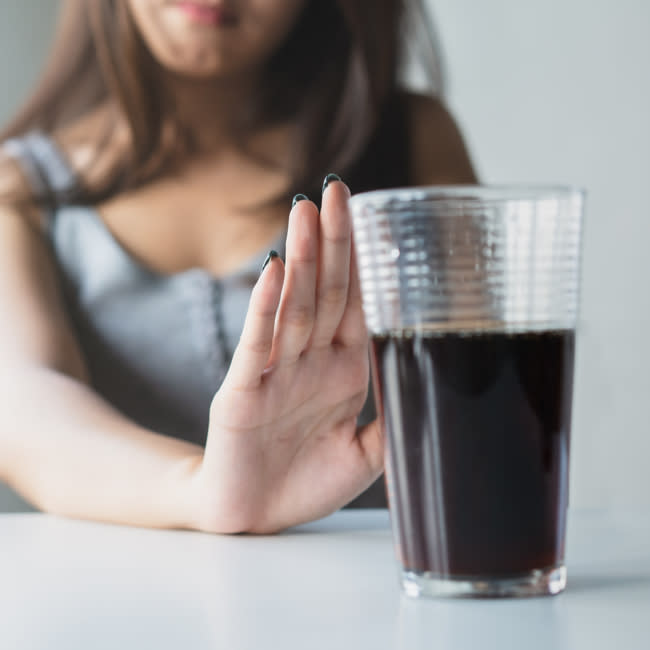3 Beverages No One Should Be Drinking Anymore Because They Lead To Weight Gain And Inflammation

This post has been updated since its original publish date to include more expert insight.
If you frequently suffer from inflammation, it’s vital to reevaluate the beverages that you consume daily, health experts tell us, to determine what triggers this for you. Many of us sip on inflammatory drinks without even realizing their power to also cause bloating, cramps, weight gain, indigestion, etc. With that said, we checked in with health and nutrition experts to learn more about 3 drinks anyone who commonly experiences inflammation (and who wants to prevent weight gain) should avoid, and why. Read on for tips, suggestions and insight from Nataly Komova, RD, registered dietitian and fitness expert, Sara Chatfield, MPH, RDN, registered dietitian and nutritionist and Dana Ellis Hunnes, PhD, MPH, RD, registered dietitian and nutrition expert.

Tip #1— Skip Sodas, Replace With Kombucha
While replacing any of your favorite high-sugar or high-calorie beverages with water is the optimal solution for inflammation and the best way to go, that may be difficult to do at first. If you often sip on sodas, colas or other similarly fizzy and sugary drinks, Hunnes suggests opting for kombucha instead, as it is a probiotic-rich, anti-inflammatory option. "The probiotics and the antioxidants [in kombucha] are anti-inflammatory and can aid in promoting GI health by helping to colonize the GI tract with healthy bacteria," she explains. Komova adds that soda in particular is one of the most inflammatory drinks out there, as it "can also cause insulin resistance and raise cholesterol levels, slowing weight reduction." Overall, preventing inflammation will only help your overall health (and/or) weight loss goals, as Komova says, since “inflammation can impact weight loss negatively as it alters leptin responses in the body.”
Changing these hormones impairs the brain's function in signaling the body that you have eaten to your maximum. “Leptin resistance triggers weight gain as individuals tend to consume more calories unknowingly.” The antioxidants in kombucha can not only help prevent this and aid your digestion, but also help prevent inflammation, Hunnes notes, promoting the health of the probiotics as well. “It is also thought that kombucha can slow down the digestion of carbohydrates by, likely in-part, because of the healthy anti-inflammation effects it has on the GI tract,” Hunnes says.

#2— Swap Energy Drinks For Lightly Sweetened Coffee
If you like to wake up with the help of an energy drink, this will only exacerbate your inflammatory symptoms, Komova says. With so much sugar, fruit-like flavors and an instant serving of caffeine, energy drinks are popular for their taste, but as Komova explains, their potential to cause inflammation is a notable concern. “I strongly advise you to keep these drinks from your weight loss diet routines,” Komova says, referring to energy drinks, the common beverages containing stimulant compounds.“Most energy and sports drinks contain added sweeteners, colors, and sugars that are harmful to your health,” she continues. These artificial compounds, she adds, can cause chronic inflammation.
“The drinks contain processed sugars and artificial sweeteners that increase your risk of body inflammation, delaying your weight loss process.” If you need a boost of energy to help you wake up in the morning, Hunnes recommends drinking either plain black coffee (that contains zero calories, btw) or "lightly-sweetened" drinks with plant-based or monk fruit sweeteners that don't contain sugar.

#3— Avoid Sugary Sweet Tea, Try Unsweetened
Lastly, super-sweet tea is a delicious treat once in a while, but should ultimately be avoided if you're prone to inflammation, Chatfield stresses. Drinking this often leads to excess sugar consumption that can cause weight gain, she says. Sugar-sweetened beverages like sweet teas are a big culprit because “we may not think of them as being high in calories, and our bodies also don’t recognize the calories in the same way as they do those from food,” Chatfield notes. This can lead to more calorie intake later on. This, she continues, may lead to changes in fat metabolism. “There is a heightened risk of fatty liver disease, where fat builds up in the liver. Too much insulin from high sugar intake can also be detrimental to artery and heart health,” she says, noting that the drawbacks of sweet tea concern more than just inflammation.
To promote your ideal health and prevent inflammation, she recommends instead sipping on unsweetened iced tea, as this does have health benefits from its flavonoid content. Ultimately, the high sugar content of sugary sweet teas (popular teas varied from about 28-44 grams of sugar per 12 oz. serving) can quickly put you over the maximum recommended sugar intake of 24 grams per day for most women and 36 grams per day for most men. Chatfield concludes that “unsweetened iced tea is a better choice” for this reason and to prioritize and care for your digestive health.

